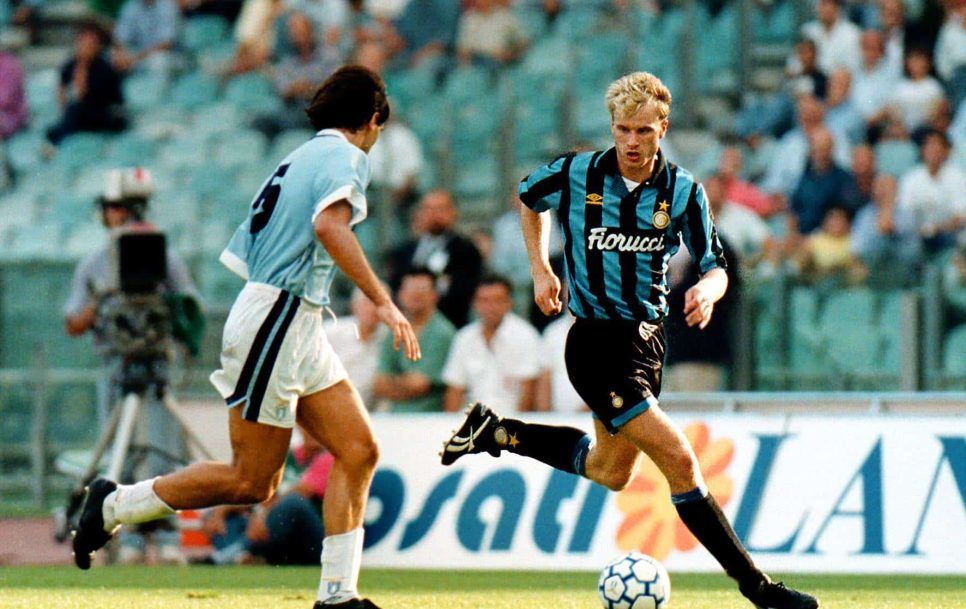Non-flying Dutchman’s forgotten Italian chapter
Dennis Bergkamp is a name that needs no introduction to any football fan. But while his career has been filled with unforgettable moments, there are some chapters most people don’t know about. And that’s where OlyBet.TV’s new story series comes in!
Celebrating his 55th birthday this year, Bergkamp is a bona fide legend for both Ajax and Arsenal, and for good reason – the “Non-flying Dutchman” (more on that nickname later) netted over 100 goals for each club.
But sandwiched between his heroics in Amsterdam and London were two somewhat forgettable years at Inter Milan.
When Inter paid £7.1 million for him in the summer of 1993, Bergkamp was already a goal-scoring machine. He had scored 122 goals in seven seasons for Ajax, with 26, 30, and 33 goals in his last three seasons. Also, he helped Ajax win domestic titles, the European Cup, and the UEFA Cup.
Rise at Euros and Real Madrid interest
His stock soared even higher at Euro ’92, where he scored three goals and was named in the team of the tournament. Bergkamp shared the tournament’s top scorer title with Henrik Larsen, Karl-Heinz Riedle, and Tomas Brolin.
After that, Real Madrid came knocking, but fellow Dutch icon Johan Cruyff, who was coaching Barcelona at the time, suggested Bergkamp wait. “He never said it in so many words, but he wanted me to join him at Barcelona. He kept telling me all the teams not to go to, leaving Barcelona as the only one left,” Bergkamp recalled.
When talks stalled, Bergkamp shifted his focus to Italy, which was the world’s top football league at the time.
“I didn’t want to go to Milan because [Ruud] Gullit, [Marco] Van Basten, and [Frank] Rijkaard had gone there. It came down to Juventus or Inter. We had a better feeling from the people at Inter. They made a lot of promises – which I found out later was something they did a lot. They said: “We’re going to play more offensively.” They did, but only for the first month! It wasn’t what I’d hoped for.”
Plethora of Coaching Changes
Despite being a regular starter, Bergkamp’s first season was underwhelming. He scored 8 goals in 31 Serie A matches – respectable, but not world-shattering. Interestingly, he was Inter’s second-highest scorer, only behind Ruben Sosa with 16 goals.
Sosa, in fact, was one of the reasons Bergkamp’s time at Inter didn’t click. Coach Osvaldo Bagnoli struggled to get the two stars to work together. Bergkamp was even experimented with as a number 10 at times, with late Salvatore Schillaci being the second striker, but that didn’t work either.
When Inter found themselves in the bottom half of the table in February, Bagnoli was sacked, and Gianpiero Marini took over. But things barely changed with Inter just narrowly – by one point – avoiding relegation.
In Europe, however, things clicked, and largely thanks to Bergkamp’s eight goals, Inter made it to the UEFA Cup final, where it beat Salzburg Casino to the title.
World Cup Woes
Still, poor domestic form led to another managerial change. Ottavio Bianchi came in, but his tactics didn’t suit Bergkamp either. To make matters worse, fatigue from the 1994 World Cup caught up with Bergkamp, and injuries limited him to just nine appearances in the first half of the season.
He played more in the second half, but only managed four goals in 26 games. By this point, the Italian media were not impressed, with one paper famously renaming their ‘L’Asino Della Settimana‘ (or ‘Donkey of the Week’) Award to ‘Bergkamp Della Settimana’ – not exactly flattering.
Behind the scenes, the club wasn’t thrilled either. New Inter owner Massimo Moratti quickly signed a new striker, Maurizio Ganz, hinting that Bergkamp’s days were numbered.
An Arsenal Lifeline
Bergkamp, ever the intelligent player, could read the writing on the wall. And when Arsenal came calling in the summer of 1995, he didn’t hesitate. Even though Moratti asked him to stay, promising changes, Bergkamp decided he didn’t want to wait around.
Though his Italian adventure wasn’t the dream he hoped for, Bergkamp took it all in stride, seeing it as a valuable learning experience. “Italy was good for my development. I learned to be more professional, learned to play against two or three defenders, and learned to play with players who were there for themselves rather than for the team,” he later reflected, also complimenting Italian defenders. “At Ajax you knew you’d get five chances a game. While at Inter you were lucky if you got one.”
Armed with that “tough love” from Italy, Bergkamp was ready to blossom in the Premier League. While he never again became a 30-goal-a-season striker, he was the perfect Robin to Arsenal’s Batman (a ka Thierry Henry), scoring 120 goals over 11 seasons.
Why the “Non-flying Dutchman”?
One last quirky fact: besides being known for his goals, Bergkamp is also famous for his fear of flying. He preferred to drive to away games when possible. But when asked if his flying phobia affected his career, his answer was simple:
“It was the opposite. When I stopped flying it freed me. Three days before a game I’d worry about the next flight. During a game, I’d be thinking about the flight back. It was stopping me from enjoying football so I had to make a decision either to go into therapy for months or years, or just cut out flying. Everybody accepted it. When I joined Arsenal, almost the first thing that came up in the contract meeting was me saying I’m not going to fly, but I can drive everywhere. It was never a problem.”







